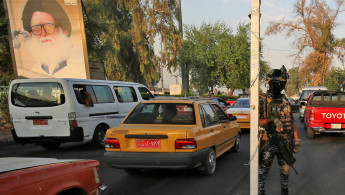Iraq calls three days of mourning for protesters killed by security forces
Iraq began three days of national mourning on Thursday for more than 100 people killed during protests, as the government carried out a small reshuffle in response to the political crisis.
While social media sites in Iraq remained inaccessible - except intermittently via virtual private network (VPN) applications - more images emerged of the violence over the past week in which mainly protesters died from live fire.
Footage showed demonstrators -- who initially demanded jobs and services before calling for "the fall of the regime" - being fatally shot, or running for cover under heavy fire.
Authorities initially blamed "unidentified snipers" and infiltrating "saboteurs" but later acknowledged that the military had used "excessive force" in the mainly Shia area of Sadr City in Baghdad.
The judiciary also announced that a riot police officer had "confessed to killing a protester" in Hilla, south of Baghdad.
Prime Minister Adel Abdel Mahdi responded to public anger in his second public address in less than a week, pledging to propose a cabinet reshuffle to parliament on Thursday.
But out of the five names he proposed, parliament only approved two candidates: Souha Khalil was put in charge of the education ministry, and Jaafar Allawi was given the health portfolio.
Read more: Why are people protesting in Iraq?
The deeply divided assembly depends on the participation of its largest bloc -- 54 lawmakers led by Shia populist cleric Muqtada al-Sadr -- which includes ministers.
But since Sadr called for the resignation of the government nearly a week ago, lawmakers have boycotted parliament, preventing it from reaching a quorum and forcing it to postpone its sessions.
Thursday's session suffered from the same divisions and was postponed indefinitely.
'Martyrs not saboteurs'
Since protests and violence calmed on Tuesday, the government has proposed reforms to lower youth unemployment, currently at 25 percent, while the labour ministry proposed an online job register.
The government has also ordered housing aid. Local authorities demolishing informal housing settlements in September fuelled the anger of protesters.
One in five Iraqis live below the poverty line, in one of the world's most oil-rich countries.
Flags were flown at half-mast Thursday to mourn those who died during the week of violence.
Those killed -- protesters and police -- have been declared "martyrs" and their families will receive compensation.
But some Iraqis were unimpressed.
"It should have taken place a week ago," said Mazen Abdullah, a shopkeeper in central Baghdad.
"It's as if they are telling us we repressed you but now we are presenting our condolences," he said of the authorities.
Hossam al-Kaabi, a 28-year-old who took part in protests in Baghdad's iconic Tahrir Square added however that he considers the national mourning as admission by authorities that "our martyrs are no saboteurs".
With the return of normal life in Baghdad, traffic has again clogged the main roads of the sprawling city of nine million inhabitants. Schools, government offices and businesses have reopened.
At checkpoints into the city and on main roads however, vehicles were searched and additional troops were deployed.
Call for investigation
Iraqi authorities have announced that "exhaustive probes" will be launched into the deadly violence during protests that left more than 100 dead and over 6,000 wounded.
"For more than a decade, Iraqi governments have said they would investigate abuses by security forces but haven't done so," said Sarah Leah Whitson, Middle East director at Human Rights Watch, in a statement.
Amnesty International - which said it interviewed eight activists and journalists who described seeing protesters killed by snipers - urged authorities to properly investigate the "use of excessive and deadly force".
Security forces did not protect protesters from sniper fire, Amnesty said, "nor have police intervened and arrested anyone responsible for firing at demonstrations".
Washington called on Baghdad to exercise "maximum restraint" in dealing with protests, while London "raised concerns" about the violence and "the need to respect peaceful protest and media freedoms".
Amnesty also described "a sinister campaign of harassment, intimidation and arrests of peaceful activists, journalists and protesters by the authorities."
Several local television stations were ransacked, and their staff threatened and asked to stop broadcasting during night raids by armed men in uniform. Journalists and activists also received threats via telephone.
With calm returning to Baghdad and the majority Shia south of Iraq, Shia Muslim pilgrims continued to converge to the holy cities of Najaf and Karbala to mark on October 20 Arbaeen religious commemorations.





 Follow the Middle East's top stories in English at The New Arab on Google News
Follow the Middle East's top stories in English at The New Arab on Google News
![Israeli forces ordered bombed Gaza's Jabalia, ordering residents to leave [Getty]](/sites/default/files/styles/image_330x185/public/2176418030.jpeg?h=a5f2f23a&itok=_YGZaP1z)

